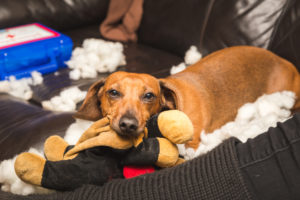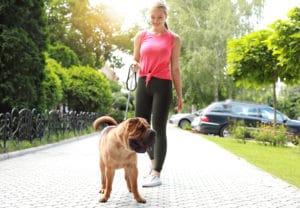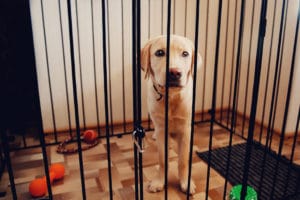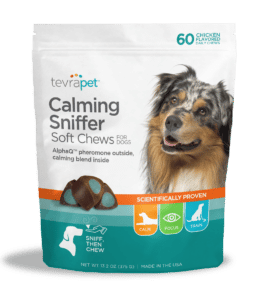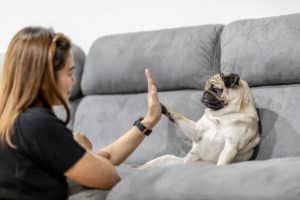Pet Health, Tevra Brands, TevraPet
Helping Dogs Deal with Separation Anxiety
Helping Dogs Deal with Separation Anxiety
Does your dog get anxious when he sees you getting ready to go somewhere? Is he beside himself when you get home? Does he chew up your things, break out of crates, or have accidents when left alone? These are just some of the signs of a behavior problem called separation anxiety.
What is separation anxiety?
Separation anxiety happens when dogs who are intensely bonded with their humans become overly stressed out when left alone. While a bit of whining or some minor chewing can be normal, especially with puppies or energetic breeds, true separation anxiety can become quite serious for some dogs. In fact, this serious and sometimes frustrating condition can become a major deal-breaker for some dog owners.
Luckily, there are lots of ways to help dogs with this condition. First, we need to understand what causes separation anxiety:
- Being left alone for the first time, especially if they’re used to being with their special person.
- Transitioning to a new home.
- Change in routine or schedule
- Loss of a family member (2 legged or 4 legged)
Signs of separation anxiety
It’s also important to recognize key signs of separation anxiety. Some of these include:
- Excessive whining or barking when left alone
- Accidents inside the house, even if normally housebroken
- Excessive chewing, digging, scratching of doors and windows
- Excessive drooling, panting, or salivating, especially right before you leave
- Frequent escape attempts
Most dogs will only exhibit some of these behaviors, and generally, they won’t be as extreme while your home. Typical dogs may occasionally whine while you’re gone, or have one or two accidents, but a dog with true separation anxiety will almost always have trouble hanging out by himself. If you have a dog with separation anxiety, there are lots of ways to help him learn to cope with alone time.
Help your dog relax
Helping your dog relax before you leave the house can relieve a lot of stress. Take them on a long walk, if possible, before you go out. Play a game of fetch with them in the backyard, or even do some training. Tired dogs tend not to be as anxious about life. Regardless of which activity you do, be sure your dog has a chance to go to the bathroom before you leave.
Crate-train your dog
Crate-training your dog will, if nothing else, give him a cozy, safe place to relax while you’re gone. If your dog is in his crate, he won’t be able to eat your new couch or have accidents on the new carpet, either. Once your dog learns to remain calm in his crate, he’ll always be safe while your away. Many dogs learn to love their crates!
Give your dog a “special” treat
Teaching your dog that good things happen when you leave the house can also be very helpful. Give him an exciting special treat right before you walk out the door. Some ideal options are stuffed Kongs, meat-flavored chews, or even frozen treats. Puzzle toys are another useful way to distract your pup. Since they require your dog to work for the treats inside, puzzle toys also provide a source of mental stimulation. Remember to give your dog his special, and long-lasting, bone or treat each time you leave. When you return home, remove it if necessary. Speaking of coming home, don’t make a big deal over your dog upon your return. Calmly ignore him for a few minutes. This may seem counter-intuitive but keeping things low-key when you greet your dog will help him remain calm, too.
Minimize outside distractions
Some dogs will bark at the sight of other dogs or people walking past their window. They may also bark at loud or unusual noises they hear outside. Closing the curtains, leaving them in a quieter room, or leaving the radio on can prevent your dog from worrying about these kinds of distractions.
Try calming supplements
Over the counter supplements are available specifically designed for dogs with anxiety. You’ll need to give them to your dog about an hour before you leave in order to get the best results. You can combine supplements with other things as well, like calming collars or anti-anxiety diffusers. CBD oil can also be helpful. Chews are the most popular form of this newer anxiety remedy, but topical CBD products and collars are also becoming more common.
Call the experts
If your dog happens to have a more serious case of separation anxiety, contact your veterinarian. This is especially important if you’re concerned your dog may accidentally harm himself in his distress. Your vet can prescribe medications that will help calm your dog. It can’t hurt to seek out a reputable trainer as well. A trainer or certified behaviorist can help you combine medications with behavior modification to help customize the perfect treatment plan for your stressed-out pup.
Separation anxiety is a common behavioral problem and manifests itself in different ways. Hopefully, you will find a solution that will help your pooch and family live in harmony.


